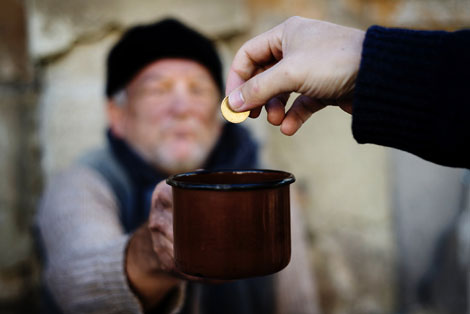Can individuals who deceitfully beg be criminally prosecuted?
Recently, a video exposing a man pretending to be a "legless" beggar on a street in China was posted on social media. The video has garnered millions of views and numerous critical comments about the beggar's fraudulent behavior.
In localities across the country, the image of beggars is no longer unfamiliar. Particularly in major cities like Ho Chi Minh City, one can encounter scenes at intersections with traffic lights, where groups of beggars, including both real and fake children and elderly, are widespread. At first glance, passersby might think these are orphans, children without family or shelter, begging as a way to survive day by day, or elderly people incapable of working who are forced to beg to get by. However, behind these scenes is a network of controllers who use beggars and children and the elderly as tools for their operations. Begging is not a profession recognized by Vietnamese law or international law, yet there is no strict regulation prohibiting this action. The problem of begging is also one of the causes contributing to criminal activities.
The begging profession plays on the psychological and emotional connection between people, which is the humanitarian aspect of society. Our ancestors often said, "The whole is bound to protect the torn," implying that everyone has different fates, thus people will feel sympathy, share, and want to help each other. However, some bad actors exploit this beautiful tradition, turning it into a disguised scam business.
So, how can we limit or eliminate this phenomenon entirely? This is an age-old question that causes much concern for many individuals, organizations, state agencies, and local authorities.
Recently, in Da Nang City, a model has been built to encourage residents not to give money to beggars while rewarding individuals and organizations who report sightings of beggars. Areas with beggars are dealt with, and those beggars collected are categorized and sent to social institutions or returned to their families. The pretenders are fined and deterred from returning to begging, and Da Nang City has seen considerable improvement in this situation.
Ho Chi Minh City has also initiated a policy against giving money to beggars. However, this call for not giving money has received mixed reactions from the public, as giving money is... a matter of personal discretion.
Begging has gradually become a social evil, and to eradicate this evil, we must first target the masterminds who professionally control beggars. Those who impersonate and deceive by begging may be criminally charged with fraud under Article 139 of the 1999 Penal Code and its guiding documents.
The effective model in Da Nang demonstrates the necessity of building a model to address the begging problem, along with policies to support the homeless, the destitute, and those in difficult economic circumstances.

- Number of deputy directors of departments in Vietnam in accordance with Decree 45/2025/ND-CP
- Cases ineligible for pardon in Vietnam in 2025
- Decree 50/2025 amending Decree 151/2017 on the management of public assets in Vietnam
- Circular 07/2025 amending Circular 02/2022 on the Law on Environmental Protection in Vietnam
- Adjustment to the organizational structure of the Ministry of Health of Vietnam: Certain agencies are no longer listed in the organizational structure
- Vietnam aims to welcome 22-23 million international tourists in Vietnam in 2025
-

- Notable new policies of Vietnam effective as of ...
- 16:26, 11/04/2025
-
.Medium.png)
- Notable documents of Vietnam in the previous week ...
- 16:21, 11/04/2025
-
.Medium.png)
- Notable documents of Vietnam in the previous week ...
- 16:11, 02/04/2025
-
.Medium.png)
- Notable new policies of Vietnam to be effective ...
- 16:04, 02/04/2025
-
.Medium.png)
- Notable new policies of Vietnam effective from ...
- 14:51, 21/03/2025
 Article table of contents
Article table of contents
